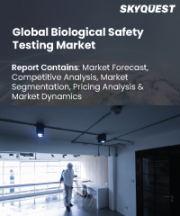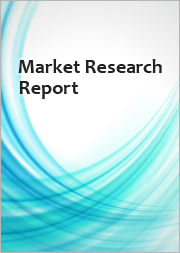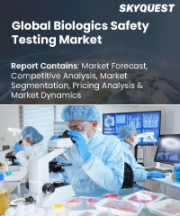
|
시장보고서
상품코드
1901883
생물 안전성 시험 시장 규모, 점유율, 성장 분석 : 제품 유형별, 시험 유형별, 용도별, 지역별 - 업계 예측(2026-2033년)Biological Safety Testing Market Size, Share, and Growth Analysis, By Product (Reagents & Kits, Services), By Test Type (Endotoxin Tests, Sterility Tests), By Application, By Region - Industry Forecast 2026-2033 |
||||||
세계의 생물 안전성 시험 시장 규모는 2024년에 58억 1,000만 달러로 평가되었고, 2025년 64억 9,000만 달러에서 2033년까지 157억 3,000만 달러로 성장할 전망이며, 예측 기간(2026-2033년) CAGR은 11.7%를 보일 것으로 예측됩니다.
제약 및 생명공학 산업의 연구개발 활동의 활성화와 의료 분야의 품질 관리에 대한 인식이 높아짐에 따라 세계 생물 안전성 시험 시장은 큰 폭의 성장이 예상되고 있습니다. 이 시장은 백신 및 세포치료제를 포함한 생물학적 제품의 안전성과 유효성을 상업화 이전에 평가하는 영역을 포괄하고 있습니다. 엄격한 규제 기준에 따라 부작용의 위험을 줄이기 위해 엄격한 안전성 테스트가 요구되고 있습니다. 또한, 핵산 증폭 및 시퀀싱과 같은 혁신적인 검사 방법에 대한 수요 증가는 잠재적 오염 물질의 검출 감도와 특이성을 높여 환자의 안전을 증진시킬 수 있습니다. 세포 기반 분석법, 면역 측정법 등 in vitro 시험 기술의 채택 확대는 빠른 결과 제공, 동물 실험의 감소, 비용 효율성 향상으로 시장 확대를 견인하고 있습니다.
세계 생물학적 안전성 테스트 시장 성장 촉진요인
세계 생물안전성 시험 시장은 세포 기반 분석 및 면역 측정법을 포함한 체외 시험법에 대한 선호도가 높아지면서 괄목할 만한 성장을 보이고 있습니다. 이러한 혁신적인 기술은 기존 동물 실험에 비해 결과의 신속성, 동물 실험에 대한 의존도 감소, 비용 효율성 향상 등 다양한 이점을 제공합니다. 더 많은 조직이 이러한 현대적 방법의 이점을 인식함에 따라, in vitro 방식으로의 전환이 가속화되고 있으며, 이는 채택률 증가로 이어지고 있습니다. 이러한 변화는 시험의 윤리적 고려에 기여할 뿐만 아니라, 전체 시장 확대에 기여하고 생물 안전성 시험 분야의 혁신적 트렌드를 강조하고 있습니다.
세계 생물 안전성 시험 시장 성장 억제요인
세계 생물 안전성 시험 시장의 성장은 시험 기술에 숙련된 자격을 갖춘 인력의 부족으로 인해 저해될 수 있습니다. 이러한 조사 방법의 고도의 특성으로 인해 생물학적 샘플 관리, 정확한 결과 해석, 규제 요건 준수에 대한 전문 지식을 갖춘 인력이 필요합니다. 이러한 훈련된 인력의 부족은 시장 확대의 장벽이 될 수 있습니다. 이는 조직이 높은 기준을 유지하거나 업계 내 혁신에 필요한 전문 지식을 갖춘 인재를 확보하는 데 어려움을 겪을 수 있기 때문입니다. 결과적으로 숙련된 전문가의 부족은 시장의 발전 속도와 서비스 제공 강화에 심각한 영향을 미칠 수 있습니다.
세계 생물 안전성 시험 시장 동향
세계 생물 안전성 시험 시장은 의료 분야에서 환자 안전에 대한 관심이 높아짐에 따라 괄목할 만한 성장세를 보이고 있습니다. 고품질 생물학적 제제에 대한 수요가 증가함에 따라 의료 제공업체, 규제 기관, 제조업체를 포함한 이해관계자들은 오염된 제품이나 비규격 제품과 관련된 위험을 줄이기 위해 엄격한 안전 프로토콜을 우선시하고 있습니다. 잠재적 부작용에 대한 인식이 높아짐에 따라 철저한 생물 안전성 시험의 필요성이 강조되고 있으며, 조직이 첨단 연구 방법 및 기술에 투자함에 따라 시장 성장을 가속하고 있습니다. 그 결과, 시장은 품질 관리 조치를 강화하고 다양한 의료 환경에서 환자의 안전과 건강을 보장하는 방향으로 진화하고 있습니다.
자주 묻는 질문
목차
서론
- 조사 목적
- 조사 범위
- 정의
조사 방법
- 정보 조달
- 2차와 1차 데이터 방법
- 시장 규모 예측
- 시장 전제조건과 제한
주요 요약
- 세계 시장 전망
- 공급과 수요 동향 분석
- 부문별 기회 분석
시장 역학과 전망
- 시장 규모
- 시장 역학
- 성장 촉진요인과 기회
- 성장 억제요인과 과제
- Porter의 Five Forces 분석
주요 시장 인사이트
- 중요 성공 요인
- 경쟁 정도
- 주요 투자 기회
- 시장 생태계
- 시장의 매력 지수(2025년)
- PESTEL 분석
- 거시경제 지표
- 밸류체인 분석
- 가격 분석
- 규제 상황
- 사례 연구
- 기술적 진보
세계의 생물 안전성 시험 시장 규모 : 제품별&CAGR(2026-2033)
- 시약 및 키트
- 서비스
- 기기
세계의 생물 안전성 시험 시장 규모 : 시험 유형별&CAGR(2026-2033)
- 엔도톡신 시험
- 무균 시험
- 세포주 인증 및 특성 평가 시험
- 바이오바덴 시험
- 외래성 병원체 감지 시험
- 잔류 숙주 오염 감지 시험
- 기타
세계의 생물 안전성 시험 시장 규모 : 용도별&CAGR(2026-2033)
- 백신 및 치료제
- 백신
- 단일클론항체
- 재조합 단백질
- 혈액 및 혈액 유래 제품
- 유전자 치료
- 조직 및 조직 유래 제품
- 줄기세포
- 기타
세계의 생물 안전성 시험 시장 규모&CAGR(2026-2033)
- 북미
- 미국
- 캐나다
- 유럽
- 독일
- 스페인
- 프랑스
- 영국
- 이탈리아
- 기타 유럽
- 아시아태평양
- 중국
- 인도
- 일본
- 한국
- 기타 아시아태평양
- 라틴아메리카
- 브라질
- 기타 라틴아메리카
- 중동 및 아프리카
- GCC 국가
- 남아프리카공화국
- 기타 중동 및 아프리카
경쟁 정보
- 주요 5개사 비교
- 주요 기업의 시장 포지셔닝(2025년)
- 주요 시장 기업이 채택한 전략
- 최근 시장 동향
- 기업의 시장 점유율 분석(2025년)
- 주요 기업 개요
- 기업 상세
- 제품 포트폴리오 분석
- 기업 부문별 점유율 분석
- 매출 전년대비 비교(2023-2025년)
주요 기업 개요
- bioMerieux S.A.(France)
- Charles River Laboratories International, Inc.(United States)
- Eurofins Scientific SE(Luxembourg)
- Lonza Group Ltd.(Switzerland)
- Merck KGaA(Germany)
- Samsung Biologics(South Korea)
- Sartorius AG(Germany)
- SGS Societe Generale de Surveillance SA(Switzerland)
- Thermo Fisher Scientific Inc.(United States)
- Avance Biosciences(United States)
- Promega Corporation(United States)
- Toxikon Corporation(United States)
- WuXi AppTec(China)
- Pace Analytical Services LLC(United States)
- Nelson Laboratories, LLC(United States)
- BioReliance Corporation(United States)
- Microbac Laboratories, Inc.(United States)
- Intertek Group plc(United Kingdom)
- Covance Inc.(United States)
결론과 제안
LSH 26.01.27Global Biological Safety Testing Market size was valued at USD 5.81 Billion in 2024 and is poised to grow from USD 6.49 Billion in 2025 to USD 15.73 Billion by 2033, growing at a CAGR of 11.7% during the forecast period (2026-2033).
The global biological safety testing market is poised for substantial growth, driven by escalating research and development efforts within the pharmaceutical and biotechnology industries, along with a heightened awareness of quality control in healthcare. This market encompasses the assessment of biological products, including vaccines and cell-based therapies, to ensure their safety and efficacy prior to commercialization. Stringent regulatory standards necessitate rigorous safety testing to mitigate risks of adverse events. Additionally, the rising demand for innovative testing methods, such as nucleic acid amplification and sequencing, enhances detection sensitivity and specificity of potential contaminants, thereby fostering patient safety. The increasing preference for in vitro testing techniques like cell-based assays and immunoassays is also fueling market expansion, offering faster results, reduced animal testing, and greater cost effectiveness.
Top-down and bottom-up approaches were used to estimate and validate the size of the Global Biological Safety Testing market and to estimate the size of various other dependent submarkets. The research methodology used to estimate the market size includes the following details: The key players in the market were identified through secondary research, and their market shares in the respective regions were determined through primary and secondary research. This entire procedure includes the study of the annual and financial reports of the top market players and extensive interviews for key insights from industry leaders such as CEOs, VPs, directors, and marketing executives. All percentage shares split, and breakdowns were determined using secondary sources and verified through Primary sources. All possible parameters that affect the markets covered in this research study have been accounted for, viewed in extensive detail, verified through primary research, and analyzed to get the final quantitative and qualitative data.
Global Biological Safety Testing Market Segments Analysis
Global Biological Safety Testing Market is segmented by Product, Test Type, Application and region. Based on Product, the market is segmented into Reagents & Kits, Services and Instruments. Based on Test Type, the market is segmented into Endotoxin Tests, Sterility Tests, Cell Line Authentication & Characterization Tests, Bioburden Tests, Adventitious Agent Detection Tests, Residual Host Contamination Detection Tests and Others. Based on Application, the market is segmented into Vaccines & Therapeutics, Blood & Blood-based Products, Gene Therapy, Tissue & Tissue-based Products, Stem Cell and Others. Based on region, the market is segmented into North America, Europe, Asia Pacific, Latin America and Middle East & Africa.
Driver of the Global Biological Safety Testing Market
The Global Biological Safety Testing market is experiencing a significant boost from the rising preference for in vitro testing methods, including cell-based assays and immunoassays. These innovative techniques present numerous benefits compared to conventional animal testing, such as delivering faster results, minimizing the reliance on animal subjects, and enhancing cost-effectiveness. As more organizations recognize the advantages of these modern approaches, the transition towards in vitro methods is accelerating, leading to increased adoption rates. This shift not only contributes to ethical considerations in testing but also supports the overall expansion of the market, highlighting a transformative trend within the biological safety testing landscape.
Restraints in the Global Biological Safety Testing Market
The growth of the Global Biological Safety Testing market may be hindered by a shortage of qualified professionals skilled in testing techniques. The advanced nature of these methodologies necessitates individuals who possess specialized knowledge in managing biological samples, accurately interpreting results, and adhering to regulatory requirements. The scarcity of such trained personnel can create obstacles for the market's expansion, as organizations may struggle to find the expertise needed to maintain high standards and innovate within the sector. Consequently, this lack of skilled professionals could significantly impact the pace at which the market develops and enhances its service offerings.
Market Trends of the Global Biological Safety Testing Market
The Global Biological Safety Testing market is witnessing a significant trend driven by an increased emphasis on patient safety within the healthcare sector. As the demand for high-quality biological products grows, stakeholders-including healthcare providers, regulatory bodies, and manufacturers-are prioritizing stringent safety protocols to mitigate risks associated with contaminated or substandard products. This heightened awareness of potential adverse events reinforces the necessity for thorough biological safety testing, thereby propelling market growth as organizations invest in advanced testing methodologies and technologies. Consequently, the market is evolving to enhance quality control measures, ensuring the safety and well-being of patients across various healthcare settings.
Table of Contents
Introduction
- Objectives of the Study
- Scope of the Report
- Definitions
Research Methodology
- Information Procurement
- Secondary & Primary Data Methods
- Market Size Estimation
- Market Assumptions & Limitations
Executive Summary
- Global Market Outlook
- Supply & Demand Trend Analysis
- Segmental Opportunity Analysis
Market Dynamics & Outlook
- Market Overview
- Market Size
- Market Dynamics
- Drivers & Opportunities
- Restraints & Challenges
- Porters Analysis
- Competitive rivalry
- Threat of substitute
- Bargaining power of buyers
- Threat of new entrants
- Bargaining power of suppliers
Key Market Insights
- Key Success Factors
- Degree of Competition
- Top Investment Pockets
- Market Ecosystem
- Market Attractiveness Index, 2025
- PESTEL Analysis
- Macro-Economic Indicators
- Value Chain Analysis
- Pricing Analysis
- Regulatory Landscape
- Case Studies
- Technological Advancement
Global Biological Safety Testing Market Size by Product & CAGR (2026-2033)
- Market Overview
- Reagents & Kits
- Services
- Instruments
Global Biological Safety Testing Market Size by Test Type & CAGR (2026-2033)
- Market Overview
- Endotoxin Tests
- Sterility Tests
- Cell Line Authentication & Characterization Tests
- Bioburden Tests
- Adventitious Agent Detection Tests
- Residual Host Contamination Detection Tests
- Others
Global Biological Safety Testing Market Size by Application & CAGR (2026-2033)
- Market Overview
- Vaccines & Therapeutics
- Vaccines
- Monoclonal Antibodies
- Recombinant Protein
- Blood & Blood-based Products
- Gene Therapy
- Tissue & Tissue-based Products
- Stem Cell
- Others
Global Biological Safety Testing Market Size & CAGR (2026-2033)
- North America (Product, Test Type, Application)
- US
- Canada
- Europe (Product, Test Type, Application)
- Germany
- Spain
- France
- UK
- Italy
- Rest of Europe
- Asia Pacific (Product, Test Type, Application)
- China
- India
- Japan
- South Korea
- Rest of Asia-Pacific
- Latin America (Product, Test Type, Application)
- Brazil
- Rest of Latin America
- Middle East & Africa (Product, Test Type, Application)
- GCC Countries
- South Africa
- Rest of Middle East & Africa
Competitive Intelligence
- Top 5 Player Comparison
- Market Positioning of Key Players, 2025
- Strategies Adopted by Key Market Players
- Recent Developments in the Market
- Company Market Share Analysis, 2025
- Company Profiles of All Key Players
- Company Details
- Product Portfolio Analysis
- Company's Segmental Share Analysis
- Revenue Y-O-Y Comparison (2023-2025)
Key Company Profiles
- bioMerieux S.A. (France)
- Company Overview
- Business Segment Overview
- Financial Updates
- Key Developments
- Charles River Laboratories International, Inc. (United States)
- Company Overview
- Business Segment Overview
- Financial Updates
- Key Developments
- Eurofins Scientific SE (Luxembourg)
- Company Overview
- Business Segment Overview
- Financial Updates
- Key Developments
- Lonza Group Ltd. (Switzerland)
- Company Overview
- Business Segment Overview
- Financial Updates
- Key Developments
- Merck KGaA (Germany)
- Company Overview
- Business Segment Overview
- Financial Updates
- Key Developments
- Samsung Biologics (South Korea)
- Company Overview
- Business Segment Overview
- Financial Updates
- Key Developments
- Sartorius AG (Germany)
- Company Overview
- Business Segment Overview
- Financial Updates
- Key Developments
- SGS Societe Generale de Surveillance SA (Switzerland)
- Company Overview
- Business Segment Overview
- Financial Updates
- Key Developments
- Thermo Fisher Scientific Inc. (United States)
- Company Overview
- Business Segment Overview
- Financial Updates
- Key Developments
- Avance Biosciences (United States)
- Company Overview
- Business Segment Overview
- Financial Updates
- Key Developments
- Promega Corporation (United States)
- Company Overview
- Business Segment Overview
- Financial Updates
- Key Developments
- Toxikon Corporation (United States)
- Company Overview
- Business Segment Overview
- Financial Updates
- Key Developments
- WuXi AppTec (China)
- Company Overview
- Business Segment Overview
- Financial Updates
- Key Developments
- Pace Analytical Services LLC (United States)
- Company Overview
- Business Segment Overview
- Financial Updates
- Key Developments
- Nelson Laboratories, LLC (United States)
- Company Overview
- Business Segment Overview
- Financial Updates
- Key Developments
- BioReliance Corporation (United States)
- Company Overview
- Business Segment Overview
- Financial Updates
- Key Developments
- Microbac Laboratories, Inc. (United States)
- Company Overview
- Business Segment Overview
- Financial Updates
- Key Developments
- Intertek Group plc (United Kingdom)
- Company Overview
- Business Segment Overview
- Financial Updates
- Key Developments
- Covance Inc. (United States)
- Company Overview
- Business Segment Overview
- Financial Updates
- Key Developments



















